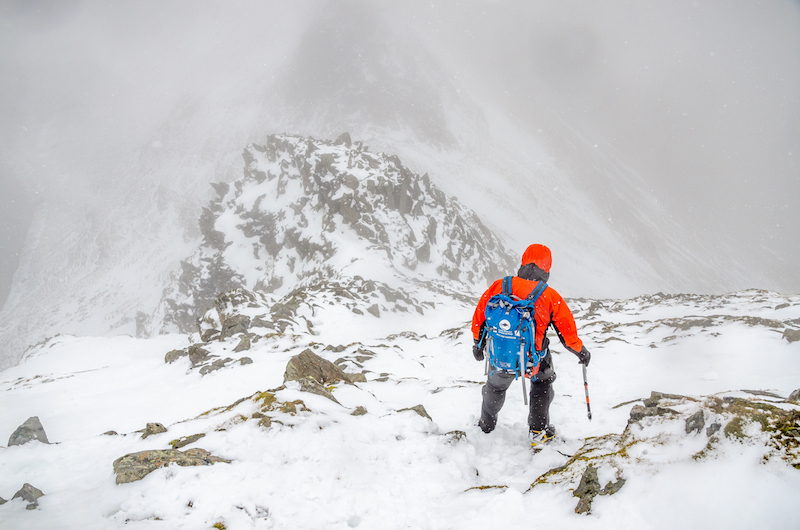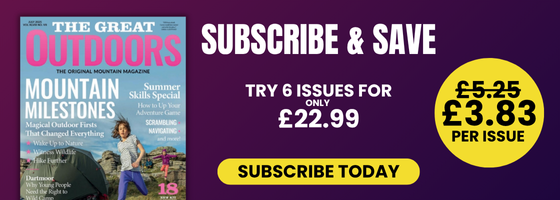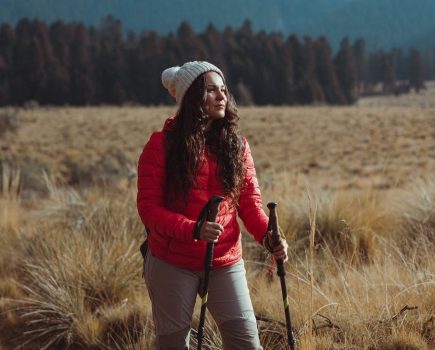The Great Outdoors speaks to Zac Poulton of the Lake District National Park Authority’s fell top assessors team about what it’s like to have ‘the best job in the world’ – and how hillwalkers can stay safe in the fells this winter.
The Lake District National Park’s fell top assessor team began their daily climbs of Helvellyn this week. Their ‘on the ground’ condition reports will be issued every day between now and April, helping to keep hillwalkers informed and safe. We caught up with fell top assessor and Everest summiteer Zac Poulton to find out more about the job often dubbed ‘best in the world’.
TGO: Tell us a little more about yourself and how you managed to land a job climbing Helvellyn every day?
Zac: I’m a full-time mountaineering instructor and expedition guide. I began my climbing career in the Lake District with the Scouts many years ago – and I’ve somehow ended up returning to my roots, after various adventures around the world including in the Himalayas and Antarctica. The fell top assessor role is an absolute dream job – you get to climb Helvellyn everyday! – but historically the assessors have tended to hold down the job for many years and vacancies don’t come up that often. Luckily I was in the right place at the right time when they expanded the role back in 2017, increasing the number of assessors from two to three.
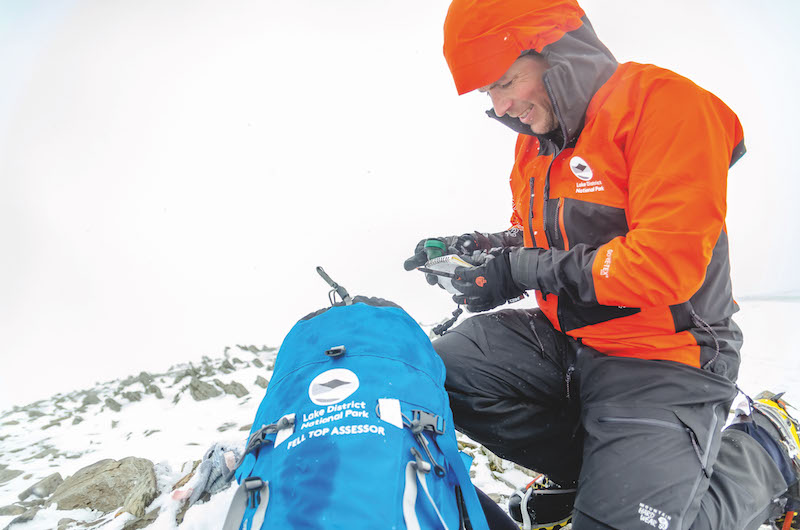
TGO: What does a fell top assessor actually do?
Zac: Throughout the winter season from December to Easter, we climb Helvellyn (or another Lake District peak) every single day, including Christmas Day. There are three parts to our role. Firstly we take snow and weather condition observations for the Lake District Weatherline service (www.lakedistrictweatherline.co.uk). Combined with the Met Office mountain forecasts, this provides a very useful resource for walkers, mountaineers, climbers and anyone else enjoying the fells. Secondly we engage with members of the public out on the hill, offering advice and support where appropriate, and thirdly we run winter skills courses designed to equip people with the skills, techniques and confidence to venture out safely in winter.
TGO: What are the best and worst bits about the job?
Zac: The best bit is definitely being out and about on the hills in all weathers, watching the conditions develop through the season. The Lake District is absolutely spectacular on those blue sky days when snow is down to the valleys. The worst is that initial moment of leaving the car when the wind is howling and the rain is hammering against the windows. Once you’re out into the thick of it, though, there’s a perverse satisfaction in experiencing conditions that fully test your fitness, skills and equipment.
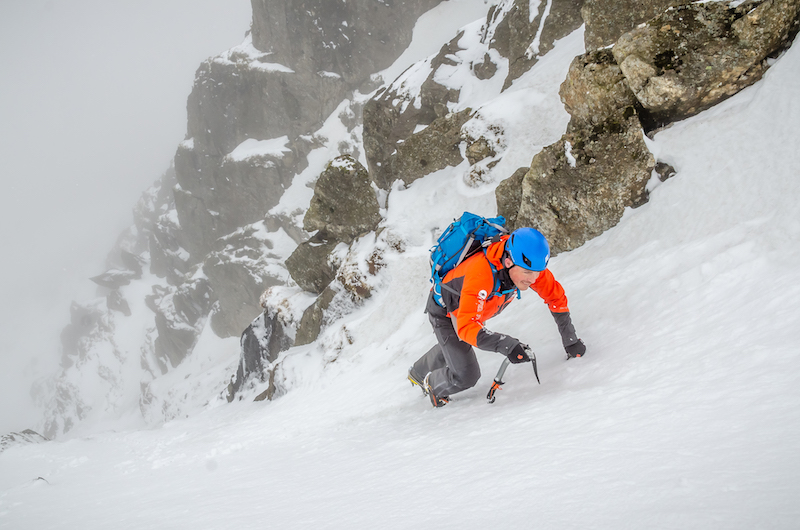
TGO: How important is the weather report you create for hillgoers and mountaineers?
Zac: It feels like a very important part of the safety chain. Those who use the service are very supportive and appreciative when we bump into them on the hill. We always have a big spike on the website traffic on Thursday lunchtime as everyone is sat at work planning their weekend adventures. If we can increase peoples’ enjoyment and safety in the hills and help prevent accidents then it’s a very fulfilling and worthwhile role.
TGO: Is engaging with members of the public a big part of your role?
Zac: Yes – I’ve spent hours walking and chatting to folk I’ve just met on the hill. We’ve pointed people in the right direction and we’ve even rescued people (and dogs). On occasion we’ve had to raise the alarm and call mountain rescue. We want to encourage people to enjoy the fells in winter, but to do it as safely as possible. We’re all very happy to chat to folk on the hill so please come and say hello if you bump into us.
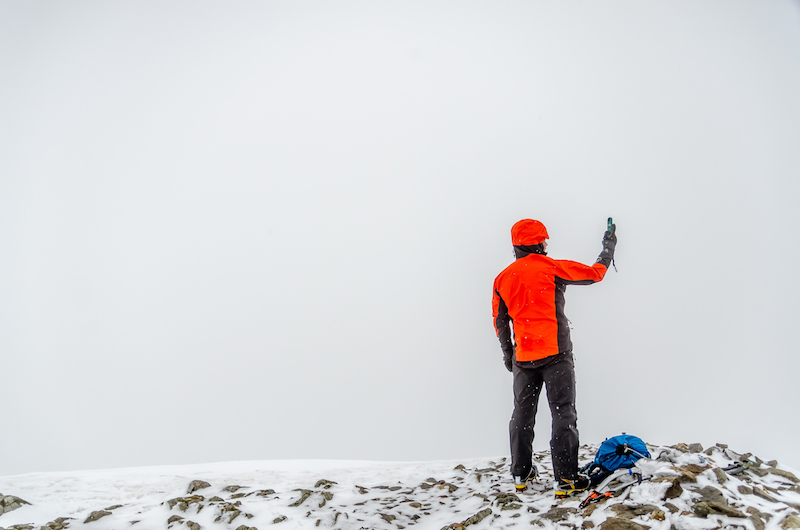
TGO: What are the main safety mistakes you see out in the wintry fells?
Zac: The biggest mistake is a lack of understanding and awareness of the unique challenges of the winter environment. What in summer may be an easy walk of a few hours can easily become a long and serious outing in winter, requiring a full repertoire of mountaineering skills. Education is key. Accidents will always happen but many could be avoided with the correct approach, equipment and decision making. In winter the biggest hazard is a simple slip, which can easily result in a long tumbling slide over broken terrain. The correct use of crampons and ice axe, however, will give walkers the ability to stop that simple slip becoming something more serious. Many accidents also involve an element of poor navigation, so make sure your skills are up to scratch and you can use your map, compass and GPS with gloves on in the worst of conditions.
TGO: What should people always think about when they’re planning a winter day?
Zac: Winter means everything takes longer – the faff factor – so be conservative with your planning. There is less daylight, you will move slower, navigation will be harder, you will use more energy, simple problems can become serious very quickly and you need more kit. Once on the hill the most important thing is always be willing to turn back if things aren’t right. It’s far better to be in the valley wishing you were on the tops, than on the tops wishing you were safely down in the valley.
Over the winter months, Zac and the other fell top assessors provide daily weather forecasts and conditions reports from Helvellyn via the Weatherline service at www.lakedistrictweatherline.co.uk. You can also follow @lakesweather on Twitter. Visit our Mountain Weather news hub for more information.

